Opinion Editorial on Climate Change, Health, and Global Challenges
VerifiedAdded on 2023/04/21
|7
|1486
|253
Essay
AI Summary
This opinion editorial critically analyzes the multifaceted challenges associated with climate change, specifically focusing on its detrimental effects on human health and wellbeing. It begins by establishing climate as a crucial factor influencing health and defines the concept of the common good in the context of environmental sustainability. The editorial synthesizes research to illustrate how climate change impacts various aspects of life, including air, food, and water, which in turn affect human health. It then explores the economic, social, and educational implications of climate change, emphasizing the challenges developing countries face. The editorial also examines the global context, including international regulations and the role of organizations like the IPCC. It highlights the projected increase in climate change-related deaths and the importance of providing infrastructure to help both developed and developing countries cope with these health challenges. The editorial concludes by emphasizing the need for governmental and individual action to protect communities from the consequences of climate change, advocating for immediate and significant steps to mitigate its effects.
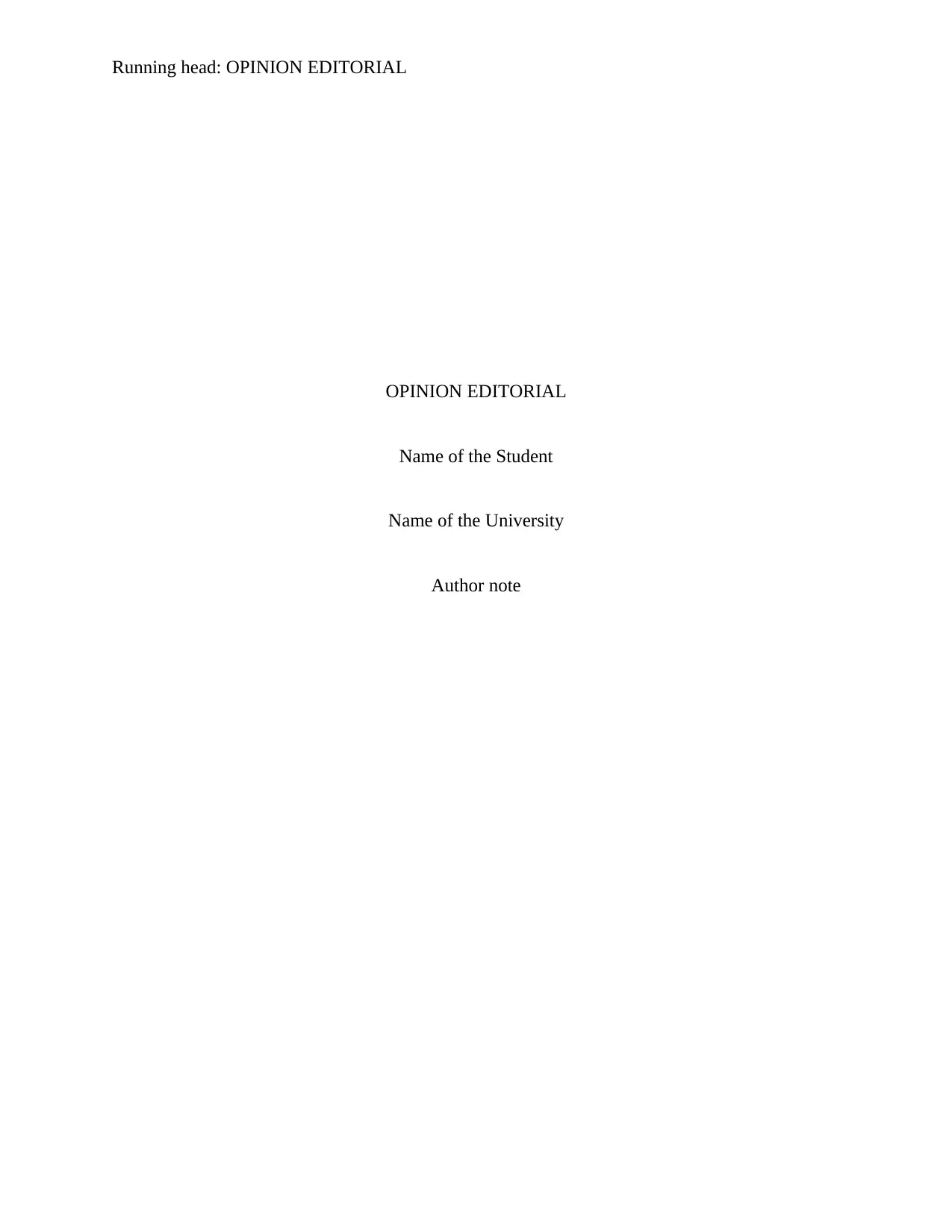
Running head: OPINION EDITORIAL
OPINION EDITORIAL
Name of the Student
Name of the University
Author note
OPINION EDITORIAL
Name of the Student
Name of the University
Author note
Paraphrase This Document
Need a fresh take? Get an instant paraphrase of this document with our AI Paraphraser
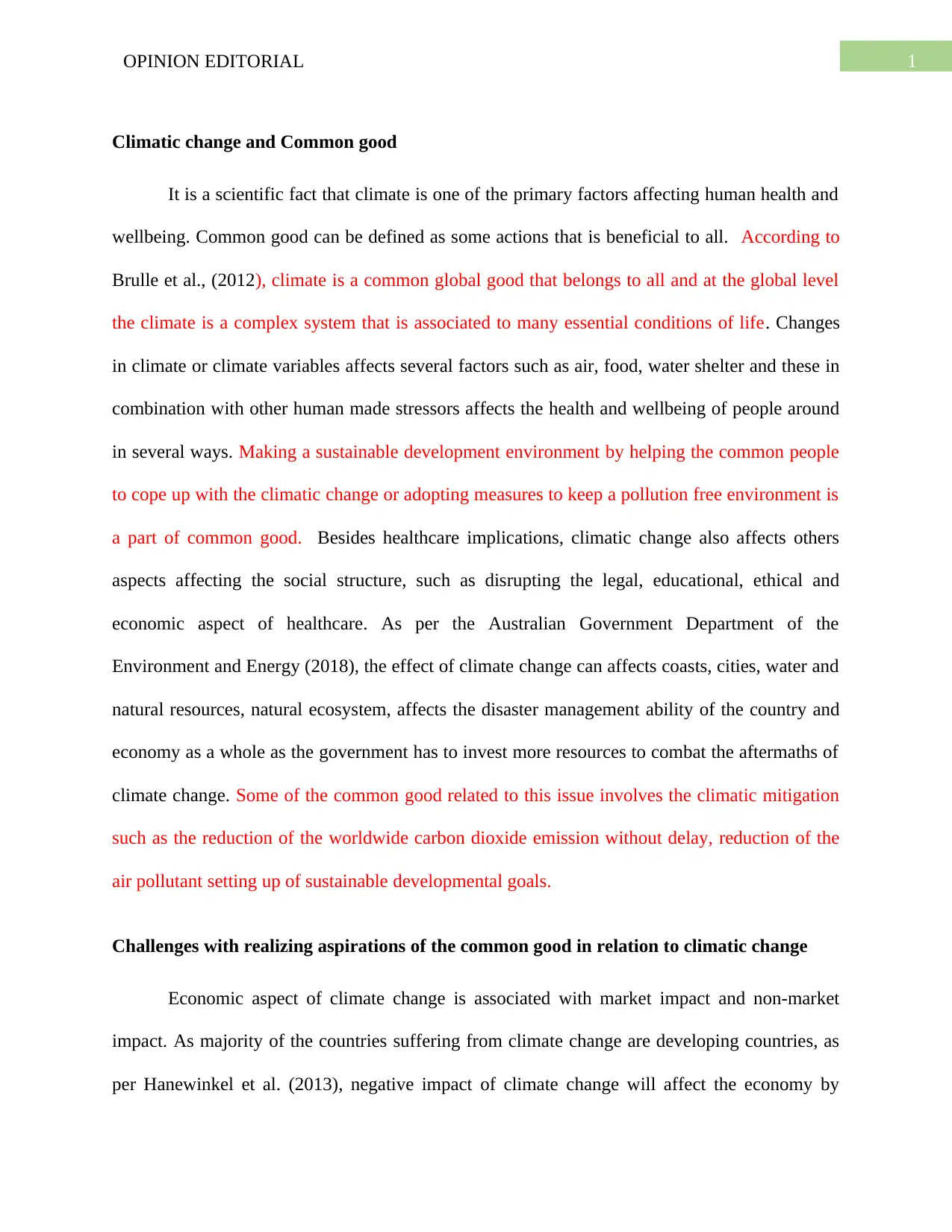
1OPINION EDITORIAL
Climatic change and Common good
It is a scientific fact that climate is one of the primary factors affecting human health and
wellbeing. Common good can be defined as some actions that is beneficial to all. According to
Brulle et al., (2012), climate is a common global good that belongs to all and at the global level
the climate is a complex system that is associated to many essential conditions of life. Changes
in climate or climate variables affects several factors such as air, food, water shelter and these in
combination with other human made stressors affects the health and wellbeing of people around
in several ways. Making a sustainable development environment by helping the common people
to cope up with the climatic change or adopting measures to keep a pollution free environment is
a part of common good. Besides healthcare implications, climatic change also affects others
aspects affecting the social structure, such as disrupting the legal, educational, ethical and
economic aspect of healthcare. As per the Australian Government Department of the
Environment and Energy (2018), the effect of climate change can affects coasts, cities, water and
natural resources, natural ecosystem, affects the disaster management ability of the country and
economy as a whole as the government has to invest more resources to combat the aftermaths of
climate change. Some of the common good related to this issue involves the climatic mitigation
such as the reduction of the worldwide carbon dioxide emission without delay, reduction of the
air pollutant setting up of sustainable developmental goals.
Challenges with realizing aspirations of the common good in relation to climatic change
Economic aspect of climate change is associated with market impact and non-market
impact. As majority of the countries suffering from climate change are developing countries, as
per Hanewinkel et al. (2013), negative impact of climate change will affect the economy by
Climatic change and Common good
It is a scientific fact that climate is one of the primary factors affecting human health and
wellbeing. Common good can be defined as some actions that is beneficial to all. According to
Brulle et al., (2012), climate is a common global good that belongs to all and at the global level
the climate is a complex system that is associated to many essential conditions of life. Changes
in climate or climate variables affects several factors such as air, food, water shelter and these in
combination with other human made stressors affects the health and wellbeing of people around
in several ways. Making a sustainable development environment by helping the common people
to cope up with the climatic change or adopting measures to keep a pollution free environment is
a part of common good. Besides healthcare implications, climatic change also affects others
aspects affecting the social structure, such as disrupting the legal, educational, ethical and
economic aspect of healthcare. As per the Australian Government Department of the
Environment and Energy (2018), the effect of climate change can affects coasts, cities, water and
natural resources, natural ecosystem, affects the disaster management ability of the country and
economy as a whole as the government has to invest more resources to combat the aftermaths of
climate change. Some of the common good related to this issue involves the climatic mitigation
such as the reduction of the worldwide carbon dioxide emission without delay, reduction of the
air pollutant setting up of sustainable developmental goals.
Challenges with realizing aspirations of the common good in relation to climatic change
Economic aspect of climate change is associated with market impact and non-market
impact. As majority of the countries suffering from climate change are developing countries, as
per Hanewinkel et al. (2013), negative impact of climate change will affect the economy by
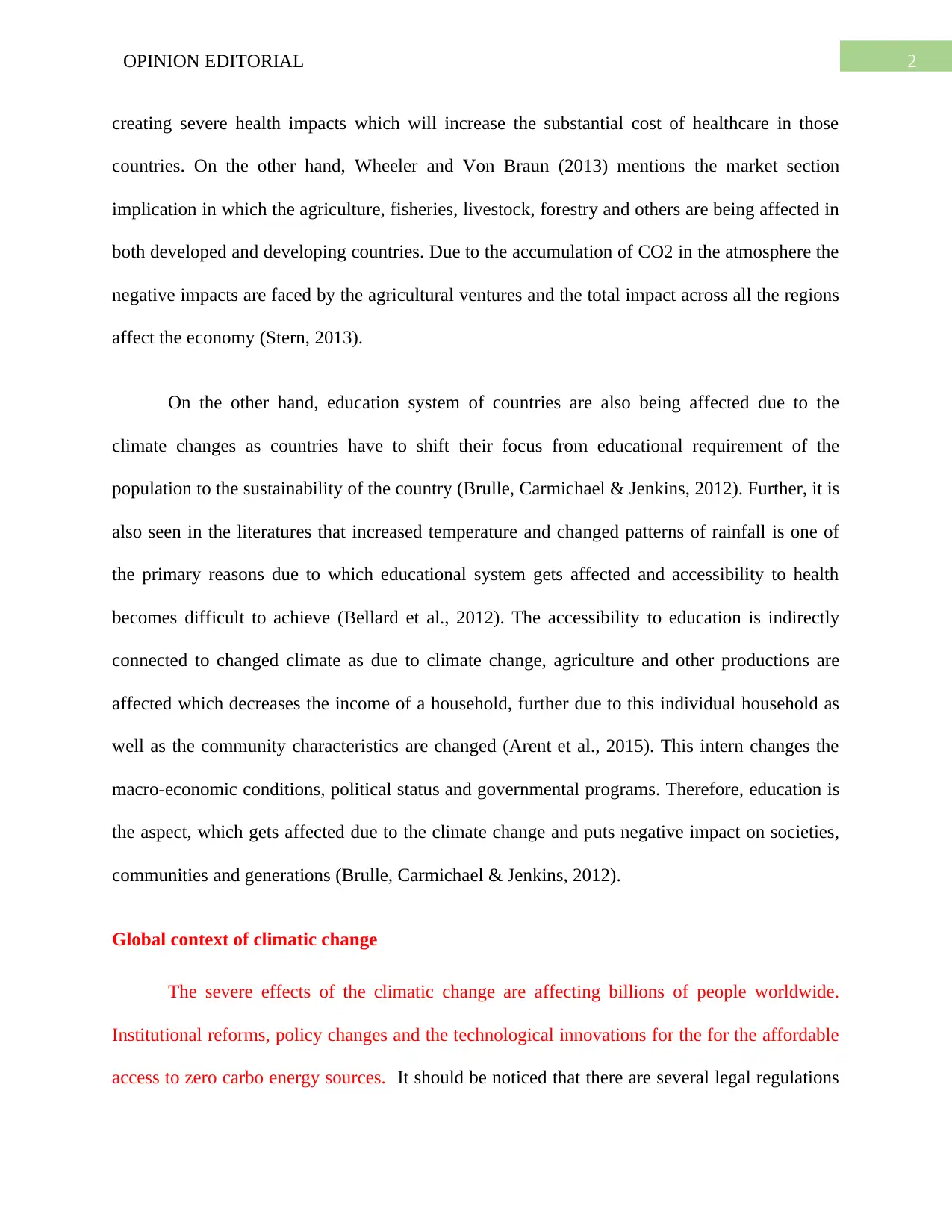
2OPINION EDITORIAL
creating severe health impacts which will increase the substantial cost of healthcare in those
countries. On the other hand, Wheeler and Von Braun (2013) mentions the market section
implication in which the agriculture, fisheries, livestock, forestry and others are being affected in
both developed and developing countries. Due to the accumulation of CO2 in the atmosphere the
negative impacts are faced by the agricultural ventures and the total impact across all the regions
affect the economy (Stern, 2013).
On the other hand, education system of countries are also being affected due to the
climate changes as countries have to shift their focus from educational requirement of the
population to the sustainability of the country (Brulle, Carmichael & Jenkins, 2012). Further, it is
also seen in the literatures that increased temperature and changed patterns of rainfall is one of
the primary reasons due to which educational system gets affected and accessibility to health
becomes difficult to achieve (Bellard et al., 2012). The accessibility to education is indirectly
connected to changed climate as due to climate change, agriculture and other productions are
affected which decreases the income of a household, further due to this individual household as
well as the community characteristics are changed (Arent et al., 2015). This intern changes the
macro-economic conditions, political status and governmental programs. Therefore, education is
the aspect, which gets affected due to the climate change and puts negative impact on societies,
communities and generations (Brulle, Carmichael & Jenkins, 2012).
Global context of climatic change
The severe effects of the climatic change are affecting billions of people worldwide.
Institutional reforms, policy changes and the technological innovations for the for the affordable
access to zero carbo energy sources. It should be noticed that there are several legal regulations
creating severe health impacts which will increase the substantial cost of healthcare in those
countries. On the other hand, Wheeler and Von Braun (2013) mentions the market section
implication in which the agriculture, fisheries, livestock, forestry and others are being affected in
both developed and developing countries. Due to the accumulation of CO2 in the atmosphere the
negative impacts are faced by the agricultural ventures and the total impact across all the regions
affect the economy (Stern, 2013).
On the other hand, education system of countries are also being affected due to the
climate changes as countries have to shift their focus from educational requirement of the
population to the sustainability of the country (Brulle, Carmichael & Jenkins, 2012). Further, it is
also seen in the literatures that increased temperature and changed patterns of rainfall is one of
the primary reasons due to which educational system gets affected and accessibility to health
becomes difficult to achieve (Bellard et al., 2012). The accessibility to education is indirectly
connected to changed climate as due to climate change, agriculture and other productions are
affected which decreases the income of a household, further due to this individual household as
well as the community characteristics are changed (Arent et al., 2015). This intern changes the
macro-economic conditions, political status and governmental programs. Therefore, education is
the aspect, which gets affected due to the climate change and puts negative impact on societies,
communities and generations (Brulle, Carmichael & Jenkins, 2012).
Global context of climatic change
The severe effects of the climatic change are affecting billions of people worldwide.
Institutional reforms, policy changes and the technological innovations for the for the affordable
access to zero carbo energy sources. It should be noticed that there are several legal regulations
⊘ This is a preview!⊘
Do you want full access?
Subscribe today to unlock all pages.

Trusted by 1+ million students worldwide
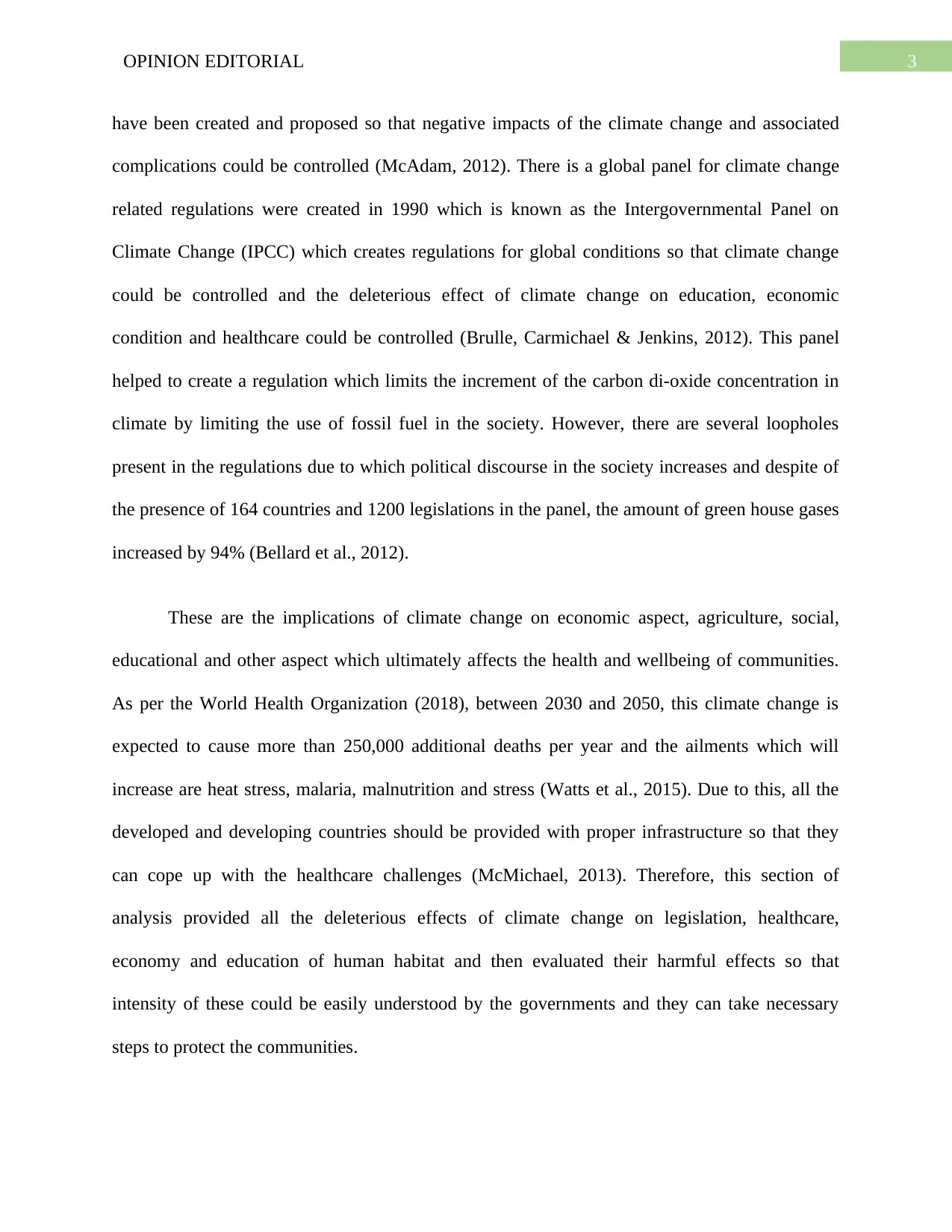
3OPINION EDITORIAL
have been created and proposed so that negative impacts of the climate change and associated
complications could be controlled (McAdam, 2012). There is a global panel for climate change
related regulations were created in 1990 which is known as the Intergovernmental Panel on
Climate Change (IPCC) which creates regulations for global conditions so that climate change
could be controlled and the deleterious effect of climate change on education, economic
condition and healthcare could be controlled (Brulle, Carmichael & Jenkins, 2012). This panel
helped to create a regulation which limits the increment of the carbon di-oxide concentration in
climate by limiting the use of fossil fuel in the society. However, there are several loopholes
present in the regulations due to which political discourse in the society increases and despite of
the presence of 164 countries and 1200 legislations in the panel, the amount of green house gases
increased by 94% (Bellard et al., 2012).
These are the implications of climate change on economic aspect, agriculture, social,
educational and other aspect which ultimately affects the health and wellbeing of communities.
As per the World Health Organization (2018), between 2030 and 2050, this climate change is
expected to cause more than 250,000 additional deaths per year and the ailments which will
increase are heat stress, malaria, malnutrition and stress (Watts et al., 2015). Due to this, all the
developed and developing countries should be provided with proper infrastructure so that they
can cope up with the healthcare challenges (McMichael, 2013). Therefore, this section of
analysis provided all the deleterious effects of climate change on legislation, healthcare,
economy and education of human habitat and then evaluated their harmful effects so that
intensity of these could be easily understood by the governments and they can take necessary
steps to protect the communities.
have been created and proposed so that negative impacts of the climate change and associated
complications could be controlled (McAdam, 2012). There is a global panel for climate change
related regulations were created in 1990 which is known as the Intergovernmental Panel on
Climate Change (IPCC) which creates regulations for global conditions so that climate change
could be controlled and the deleterious effect of climate change on education, economic
condition and healthcare could be controlled (Brulle, Carmichael & Jenkins, 2012). This panel
helped to create a regulation which limits the increment of the carbon di-oxide concentration in
climate by limiting the use of fossil fuel in the society. However, there are several loopholes
present in the regulations due to which political discourse in the society increases and despite of
the presence of 164 countries and 1200 legislations in the panel, the amount of green house gases
increased by 94% (Bellard et al., 2012).
These are the implications of climate change on economic aspect, agriculture, social,
educational and other aspect which ultimately affects the health and wellbeing of communities.
As per the World Health Organization (2018), between 2030 and 2050, this climate change is
expected to cause more than 250,000 additional deaths per year and the ailments which will
increase are heat stress, malaria, malnutrition and stress (Watts et al., 2015). Due to this, all the
developed and developing countries should be provided with proper infrastructure so that they
can cope up with the healthcare challenges (McMichael, 2013). Therefore, this section of
analysis provided all the deleterious effects of climate change on legislation, healthcare,
economy and education of human habitat and then evaluated their harmful effects so that
intensity of these could be easily understood by the governments and they can take necessary
steps to protect the communities.
Paraphrase This Document
Need a fresh take? Get an instant paraphrase of this document with our AI Paraphraser

4OPINION EDITORIAL
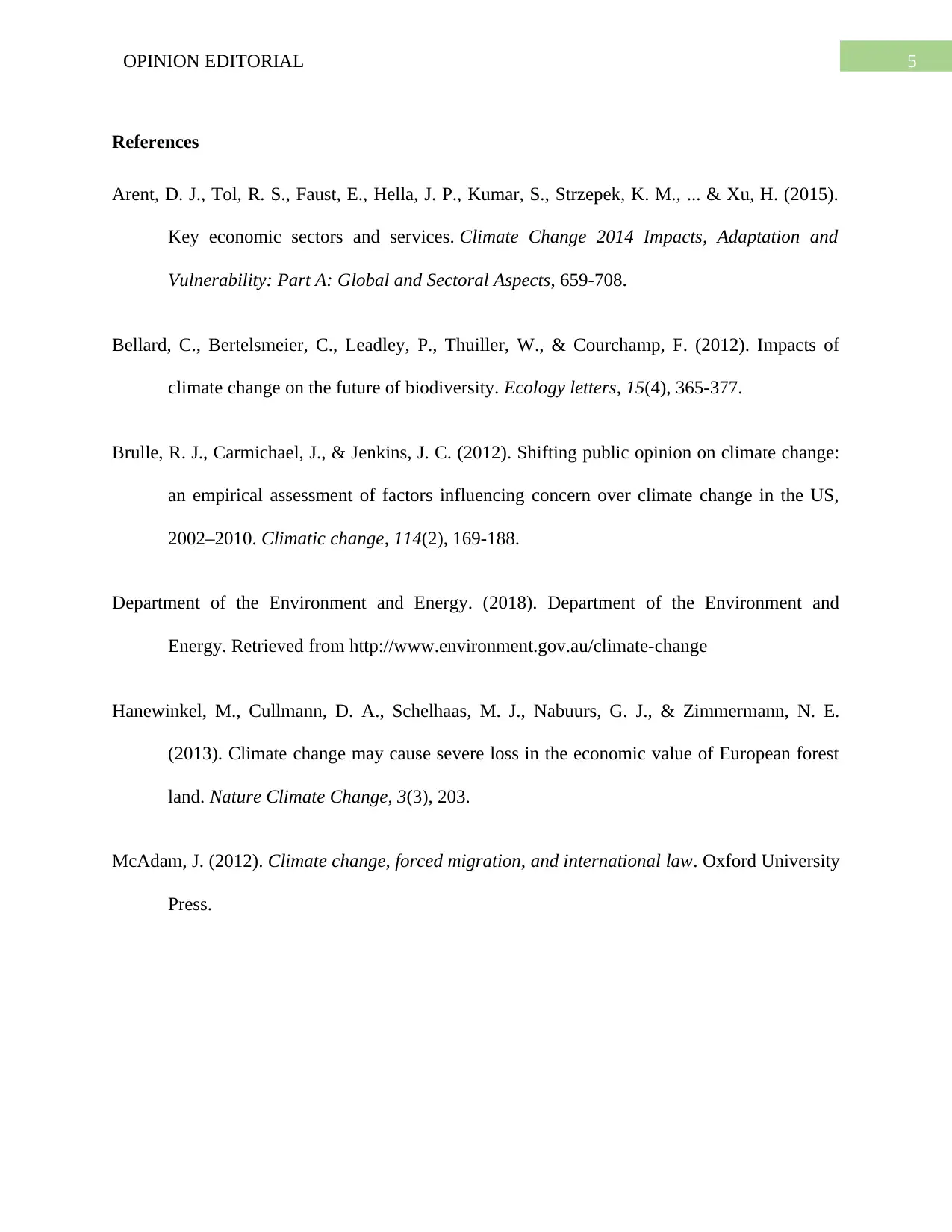
5OPINION EDITORIAL
References
Arent, D. J., Tol, R. S., Faust, E., Hella, J. P., Kumar, S., Strzepek, K. M., ... & Xu, H. (2015).
Key economic sectors and services. Climate Change 2014 Impacts, Adaptation and
Vulnerability: Part A: Global and Sectoral Aspects, 659-708.
Bellard, C., Bertelsmeier, C., Leadley, P., Thuiller, W., & Courchamp, F. (2012). Impacts of
climate change on the future of biodiversity. Ecology letters, 15(4), 365-377.
Brulle, R. J., Carmichael, J., & Jenkins, J. C. (2012). Shifting public opinion on climate change:
an empirical assessment of factors influencing concern over climate change in the US,
2002–2010. Climatic change, 114(2), 169-188.
Department of the Environment and Energy. (2018). Department of the Environment and
Energy. Retrieved from http://www.environment.gov.au/climate-change
Hanewinkel, M., Cullmann, D. A., Schelhaas, M. J., Nabuurs, G. J., & Zimmermann, N. E.
(2013). Climate change may cause severe loss in the economic value of European forest
land. Nature Climate Change, 3(3), 203.
McAdam, J. (2012). Climate change, forced migration, and international law. Oxford University
Press.
References
Arent, D. J., Tol, R. S., Faust, E., Hella, J. P., Kumar, S., Strzepek, K. M., ... & Xu, H. (2015).
Key economic sectors and services. Climate Change 2014 Impacts, Adaptation and
Vulnerability: Part A: Global and Sectoral Aspects, 659-708.
Bellard, C., Bertelsmeier, C., Leadley, P., Thuiller, W., & Courchamp, F. (2012). Impacts of
climate change on the future of biodiversity. Ecology letters, 15(4), 365-377.
Brulle, R. J., Carmichael, J., & Jenkins, J. C. (2012). Shifting public opinion on climate change:
an empirical assessment of factors influencing concern over climate change in the US,
2002–2010. Climatic change, 114(2), 169-188.
Department of the Environment and Energy. (2018). Department of the Environment and
Energy. Retrieved from http://www.environment.gov.au/climate-change
Hanewinkel, M., Cullmann, D. A., Schelhaas, M. J., Nabuurs, G. J., & Zimmermann, N. E.
(2013). Climate change may cause severe loss in the economic value of European forest
land. Nature Climate Change, 3(3), 203.
McAdam, J. (2012). Climate change, forced migration, and international law. Oxford University
Press.
⊘ This is a preview!⊘
Do you want full access?
Subscribe today to unlock all pages.

Trusted by 1+ million students worldwide
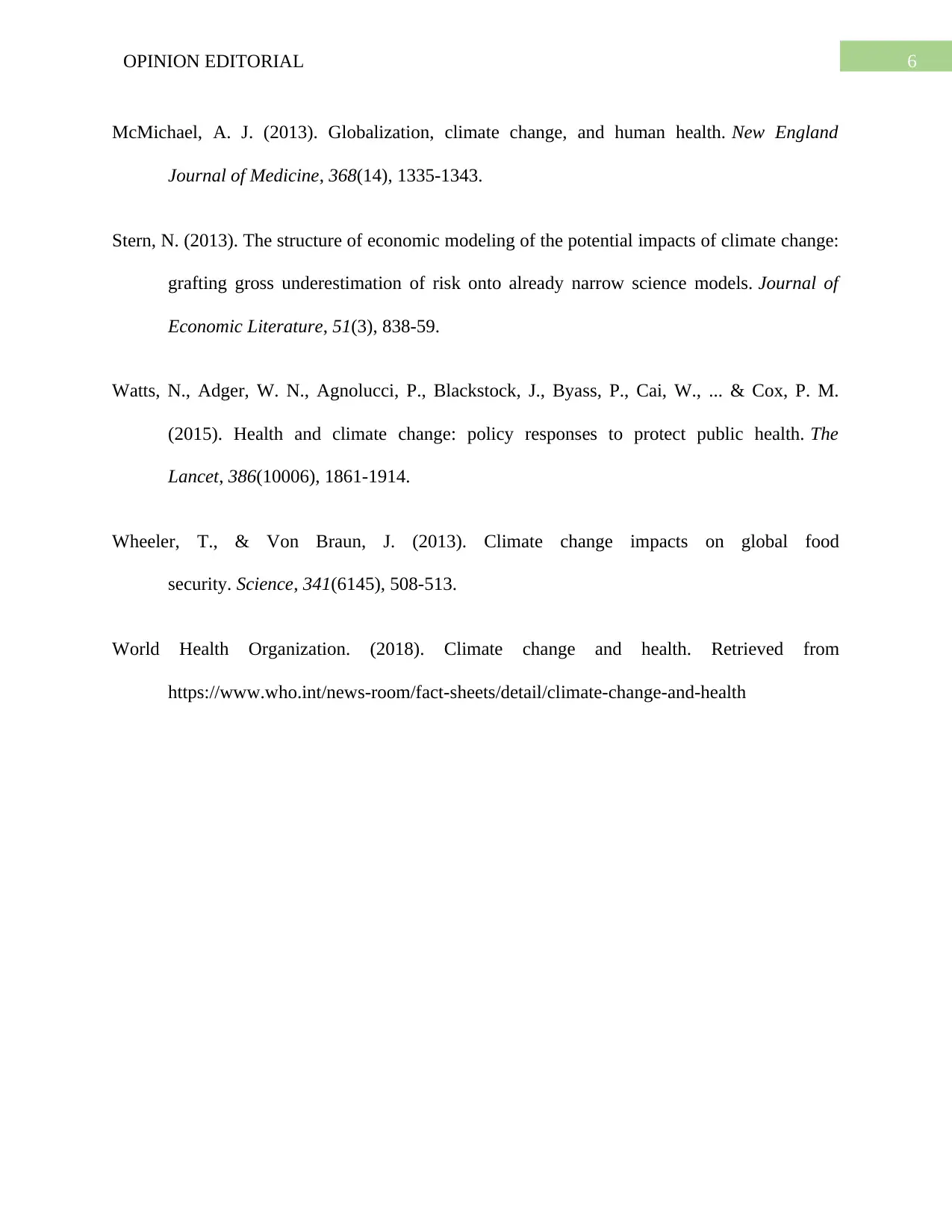
6OPINION EDITORIAL
McMichael, A. J. (2013). Globalization, climate change, and human health. New England
Journal of Medicine, 368(14), 1335-1343.
Stern, N. (2013). The structure of economic modeling of the potential impacts of climate change:
grafting gross underestimation of risk onto already narrow science models. Journal of
Economic Literature, 51(3), 838-59.
Watts, N., Adger, W. N., Agnolucci, P., Blackstock, J., Byass, P., Cai, W., ... & Cox, P. M.
(2015). Health and climate change: policy responses to protect public health. The
Lancet, 386(10006), 1861-1914.
Wheeler, T., & Von Braun, J. (2013). Climate change impacts on global food
security. Science, 341(6145), 508-513.
World Health Organization. (2018). Climate change and health. Retrieved from
https://www.who.int/news-room/fact-sheets/detail/climate-change-and-health
McMichael, A. J. (2013). Globalization, climate change, and human health. New England
Journal of Medicine, 368(14), 1335-1343.
Stern, N. (2013). The structure of economic modeling of the potential impacts of climate change:
grafting gross underestimation of risk onto already narrow science models. Journal of
Economic Literature, 51(3), 838-59.
Watts, N., Adger, W. N., Agnolucci, P., Blackstock, J., Byass, P., Cai, W., ... & Cox, P. M.
(2015). Health and climate change: policy responses to protect public health. The
Lancet, 386(10006), 1861-1914.
Wheeler, T., & Von Braun, J. (2013). Climate change impacts on global food
security. Science, 341(6145), 508-513.
World Health Organization. (2018). Climate change and health. Retrieved from
https://www.who.int/news-room/fact-sheets/detail/climate-change-and-health
1 out of 7
Related Documents
Your All-in-One AI-Powered Toolkit for Academic Success.
+13062052269
info@desklib.com
Available 24*7 on WhatsApp / Email
![[object Object]](/_next/static/media/star-bottom.7253800d.svg)
Unlock your academic potential
Copyright © 2020–2025 A2Z Services. All Rights Reserved. Developed and managed by ZUCOL.





